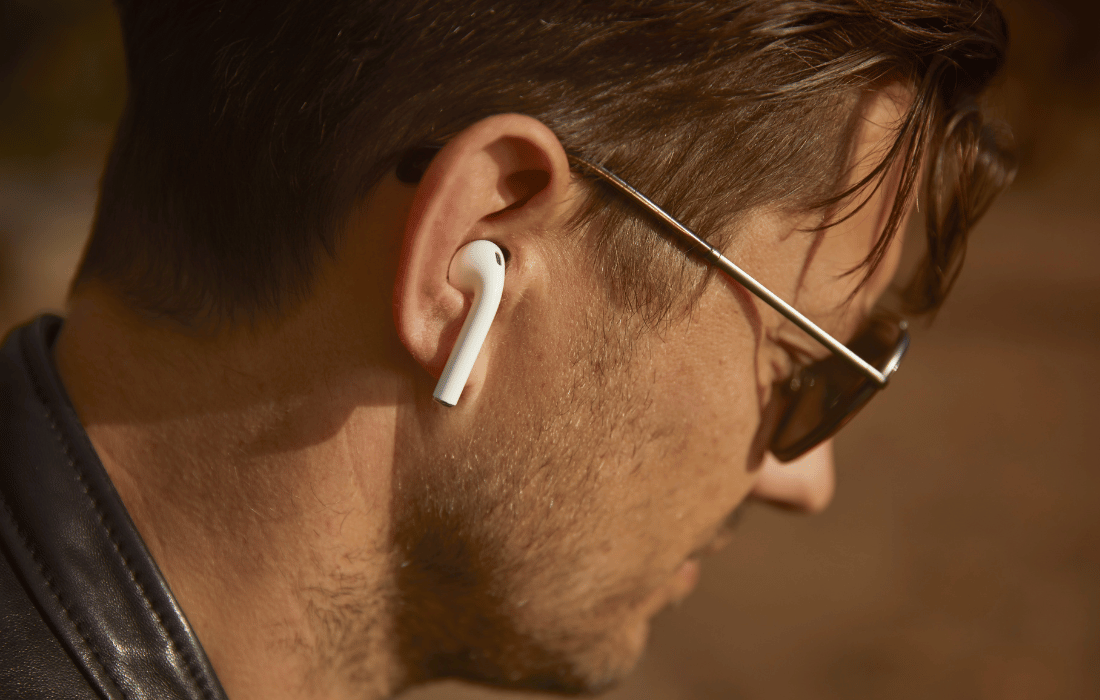Let’s be honest—AirPods are convenient. You pop them in, and they instantly become a part of your daily rhythm. But what if I told you that your beloved wireless devices might be quietly sabotaging one of the most vital hormones for men—testosterone?
It sounds a bit dramatic, I know. You probably think, “How could something as harmless as wireless earbuds affect my testosterone levels?” Let’s dig into that because the rabbit hole between modern tech and our health is deeper than you might expect. By the end of this article, you might want to rethink how often you’re jamming out to Spotify through those little white buds.
The Testosterone Crisis: Modern Men Are Falling Behind
First, let’s talk about the elephant in the room: testosterone levels in men are dropping, and they have been for decades. Studies show a steady decline in average testosterone levels across generations, meaning men today generally have less testosterone than their fathers and grandfathers. Low testosterone leads to a slew of issues—fatigue, depression, loss of muscle mass, decreased libido—you name it. It’s not just about how we perform in the gym or the bedroom; it’s about overall well-being.
So, where do AirPods come in? They’re not the only culprit, but they might just be adding insult to injury.
EMF Exposure: The Hidden Threat in Your Pocket (or Ears)
Electromagnetic fields (EMFs) are invisible energy waves emitted by every electronic device you own. Phones, Wi-Fi routers, microwaves, and—yes—AirPods. The problem is, that when your body is constantly bombarded with EMF, it can cause oxidative stress, damage to cellular structures, and disrupt hormone production.
Research indicates that EMF exposure is directly linked to lower testosterone levels. Studies have found that prolonged exposure to EMF from mobile phones reduced testosterone production in rats. While we’re not rats, the principle remains the same: when your body is hit with electromagnetic radiation for extended periods, testosterone production can take a nosedive.
Here’s the kicker—AirPods aren’t just on your head; they’re embedded in your ear canal, which puts them closer to your brain and glands than just about any other device you use regularly.
The Role of the Leydig Cells: Ground Zero for Testosterone
Testosterone is produced in the testes by Leydig cells. Think of these cells as the factory workers that keep your testosterone levels humming. Studies have shown that EMF exposure can impair the function of Leydig cells, leading to reduced testosterone production.
Prolonged exposure to wireless technology, particularly devices like AirPods, places these cells under oxidative stress. The body’s response? Hormonal disruption, and, yes, that means your testosterone factory slows down. So, while you might not feel it immediately, using AirPods for hours daily could be chipping away at one of the most important aspects of your masculinity—your ability to produce testosterone.
Bluetooth Radiation: Death by a Thousand Tiny Cuts?
Sure, EMF from AirPods might be relatively low compared to your cell phone or Wi-Fi router. But, unlike your phone, which you hopefully aren’t glued to 24/7, AirPods are designed to be worn for long periods, close to some very vital organs—your brain, pituitary gland, and even the hypothalamus. All of these are major players in hormone regulation, including testosterone production.
It’s like being exposed to radiation in small, constant doses. While one big hit of radiation is dangerous, consistent, low-level exposure might be even worse because it’s harder to detect. It’s death by a thousand tiny cuts.
Stress, Testosterone, and AirPods: A Nasty Combination
Now, let’s add another layer to this. EMF exposure, like the kind you get from AirPods, doesn’t just directly attack your Leydig cells or hypothalamus—it also messes with your stress response. EMF contributes to elevated cortisol levels, the infamous stress hormone. And when cortisol is high, testosterone is low. They have an inverse relationship, which means more stress equals less testosterone.
Now consider the fact that you’re probably wearing AirPods during high-stress activities: conference calls, traffic jams, or while doom-scrolling through Twitter. By combining stress and EMF exposure, you’re essentially kicking your testosterone levels while they’re already down.
The Proximity Problem: Your Brain and Hormone Regulation
This is where things get even more concerning. AirPods are placed right inside your ears, which are a stone’s throw away from your brain and critical glands involved in hormone regulation, like the hypothalamus and pituitary gland. The pituitary gland is the master gland that controls everything from growth to reproduction to testosterone production.
Studies on EMF exposure and brain function suggest that prolonged exposure can lead to oxidative stress in brain tissues, which is connected to neurodegenerative diseases like Alzheimer’s. But what about your hormones? While we don’t yet have extensive human trials on AirPods specifically, it’s not a stretch to consider that constant EMF exposure near your brain could be subtly disrupting hormone production pathways.
But Don’t Panic (Yet)
I’m not saying that AirPods are the sole culprit for plummeting testosterone levels across the board, but they’re certainly a contributing factor. After all, it’s not just AirPods that are affecting us—it’s a whole host of factors in our modern world. From poor nutrition to lack of sleep to chronic stress, testosterone is being assaulted from all sides.
However, that doesn’t mean we should ignore the impact of wireless technology on our health, especially when we use it so often. AirPods are just one more layer of modern convenience that might come with an unexpected cost.
What About Bluetooth? How Much Radiation Are We Really Exposed To?
Let’s talk numbers. Bluetooth, the technology AirPods use to connect to your phone, operates at around 2.45 GHz, a frequency within the microwave spectrum. While the radiation levels from Bluetooth devices are considered “low-energy,” they’re still within the range that can cause biological harm with prolonged exposure.
There’s a growing body of research indicating that even low-level radiation over extended periods can lead to biological changes. Chronic, low-level EMF exposure has been associated with increased oxidative stress, DNA damage, and disruptions to cell metabolism, all of which can affect hormone production.
AirPods Aren’t Alone: EMF is Everywhere
AirPods are just one piece of the larger EMF puzzle. Wi-Fi routers, mobile phones, smartwatches, and pretty much any wireless device are constantly exposing you to EMF. The problem is cumulative. Every bit of exposure adds up, leading to an increase in oxidative stress, inflammation, and—you guessed it—a reduction in testosterone.
What makes AirPods a unique concern is how close they sit to the brain and hormone-regulating glands. Sure, your phone emits EMF too, but it’s not glued to your head all day (at least, I hope it’s not). AirPods, on the other hand, are designed to be worn for hours on end.
So, Are AirPods Killing Your Testosterone?
The short answer? They might be. At the very least, they’re not doing your testosterone any favors.
The long answer involves a deeper look at how wireless technology disrupts more than just hormone production. AirPods are small but powerful, using constant communication between the left and right buds through Bluetooth technology. This communication occurs through low-level radiation, and the proximity to your brain makes it even more concerning. One of the most immediate negative effects of AirPods is that they can penetrate the blood-brain barrier.
The blood-brain barrier is like your brain’s personal bouncer—it’s designed to keep harmful substances out while allowing necessary nutrients in. However, studies have shown that EMF exposure can weaken the integrity of the blood-brain barrier, allowing toxins and harmful particles to cross over into brain tissue. Once this barrier is compromised, not only is brain health at risk, but it can also negatively affect hormone regulation, including testosterone production. The hypothalamus, a critical hormone-regulating part of the brain, becomes particularly vulnerable to disruption.
So, while AirPods might not immediately make your testosterone tank, the constant penetration of EMF into your brain tissues and glands sets the stage for long-term issues. The more we expose ourselves to these devices, the more we risk disrupting delicate systems that control everything from testosterone to mental clarity and overall health.
What Can You Do About It?
Now that we’ve gone down the rabbit hole, you’re probably thinking, “Great, I love my AirPods, but I also want to keep my testosterone levels intact.” Here’s the good news—you don’t have to completely give them up. But moderation and protection are key.
Here are some simple actions you can take to protect yourself:
Limit Use: Be mindful of how long you wear your AirPods. Do you really need them in for that 4-hour Netflix binge? Probably not.
Switch to Wired When Possible: While it may not be as trendy, using wired headphones can drastically cut down on EMF exposure.

Get 25% off all Aires Tech Lifetune EMF protection devices with code “PRIME” Invest in EMF Protection: There are products on the market, like the Aires Tech devices I always mention, that can mitigate the effects of EMF exposure. Whether it’s an AirPod shield or a phone patch, these products can reduce the oxidative stress that’s killing your testosterone.
Unplug at Night: EMF exposure is cumulative, and your body needs time to recover. Shut off your AirPods, your phone, and your Wi-Fi router at night. Give your body some space to repair and rejuvenate.
Support Testosterone Production Naturally: Focus on a diet rich in healthy fats, plenty of sleep, and regular exercise. Foods like grass-fed beef, pasture-raised eggs, and even supplements like magnesium and zinc can help support your natural testosterone levels.
Final Thoughts: AirPods, Tech, and the Future of Masculinity
Wireless tech is here to stay, and it’s only getting more integrated into our lives. But as we embrace the convenience, we also have to be aware of the consequences. AirPods may not be the sole cause of declining testosterone levels, but they’re certainly part of the equation.
In a world where tech is taking over every aspect of our lives, it’s more important than ever to stay informed, stay balanced, and—above all—protect your masculinity. After all, it’s not just about looking cool while listening to podcasts. It’s about making sure your body can keep doing what it was designed to do: thrive.
So, pop those AirPods out every now and then, gents. Your testosterone will thank you.









